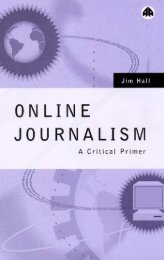Modul Mata Kuliah Journalisme Online - Ayo Menulis FISIP UAJY
Modul Mata Kuliah Journalisme Online - Ayo Menulis FISIP UAJY
Modul Mata Kuliah Journalisme Online - Ayo Menulis FISIP UAJY
Create successful ePaper yourself
Turn your PDF publications into a flip-book with our unique Google optimized e-Paper software.
Many popular blogs written by journalists feature much more detail about a reporter's personal life than<br />
their work in other media. This "personalization" is OK, as long as details of their personal life don't<br />
compromise their independence (for instance, a political reporter discussing who they voted for).<br />
Why should a reporter not show a stronger voice online than in the paper?<br />
This is an issue that each organization will have to address. There seems to be little doubt that the Web<br />
audience at large is attracted to content with more "voice" than traditional journalism allows for, but<br />
deciding on whether and how to experiment are brand-specific questions. One problem with voice is<br />
that it often is used to mask ignorance. And the line between "strong voice" and "opinion" is tough to<br />
define. Also, a journalist's strength may not lie in "voice" as much as expertise. The Web provides<br />
opportunities for much more in-depth and interactivity; a smart journalistic organization may want to<br />
explore the "depth" strategy before resorting to "voice."<br />
Are different tones OK for different sub-brands under one media brand?<br />
The journalism values of a company should be reflected in all its sub-brands. Of course, requiring all subbrands<br />
to have the same tone defeats the purpose of sub-brands. One caveat: Think twice before<br />
allowing a reporter who contributes news for one brand to offer opinion for your other brand. This is<br />
one for your editor. And, whenever in doubt, tell the readers in no uncertain terms what you're doing<br />
and why you're doing it.<br />
(This section composed by: Tom Heslin, Jim Brady, Jeremy Gilbert, Kurt Muller, Elaine Zinngrabe & Bob<br />
Steele)<br />
Reporting from the internet<br />
We are committed to aggressive journalism in all its forms, including in the field of computer-assisted<br />
reporting, but we draw the line at illegal behaviour. Internet reporting is nothing more than applying the<br />
principles of sound journalism to the sometimes unusual situations thrown up in the virtual world. The<br />
same standards of sourcing, identification and verification apply. Apply the same precautions online that<br />
you would use in other forms of newsgathering and do not use anything from the Internet that is not<br />
sourced in such a way that you can verify where it came from.<br />
No falsehoods<br />
Reporters must never misrepresent themselves, including in chat rooms and other online discussion<br />
forums. They do not “pick locks” in pursuit of information, nor do they otherwise obtain information<br />
illegally. Discovering information publicly available on the web is fair game. Defeating passwords or<br />
other security methods is going too far.
















